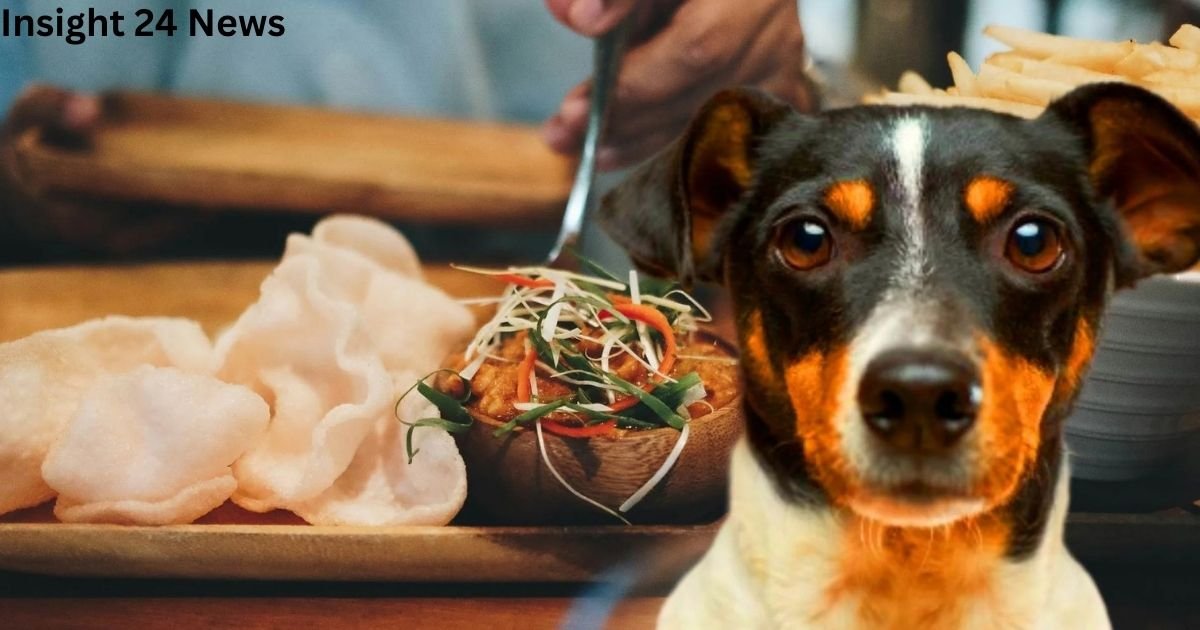Introduction
When it comes to feeding our dogs, it’s important to consider not only what they enjoy but also what is safe for them. As pet owners, we often wonder whether it’s okay to share some of our snacks with our furry friends, and prawn crackers may seem like an innocent treat. But before tossing your dog a prawn cracker, it’s essential to understand whether these snacks are suitable for their health.
This article will address common questions about prawn crackers and dogs, including the risks associated with feeding them to your pet. You’ll also find out if prawns themselves are safe for dogs to eat and whether Chinese-style prawn crackers or prawn cocktail crisps are harmful to your dog. By the end of this article, you’ll have a better idea of which treats are safe for your dog and which ones you should avoid.
1. Can Animals Eat Prawn Crackers?
1.1. General Overview of Prawn Crackers
Prawn crackers are a popular snack often served at Asian restaurants, particularly in Chinese cuisine. Made primarily from starch (like tapioca or rice flour) and seasoned with prawns, they are fried until crispy. Prawn crackers come in a variety of flavors, but they typically rely on the combination of prawns, salt, and various spices for their taste.
The ingredients in prawn crackers can vary, depending on the brand or recipe. Most prawn crackers contain starch, prawns (or prawn powder), salt, sugar, and sometimes MSG (monosodium glutamate) or other seasonings like garlic and onion powder. While they may taste good to humans, these ingredients might not be safe for pets.
1.2. Potential Risks for Pets
Although prawn crackers are not toxic to animals in small amounts, they can be harmful if fed regularly or in large quantities. The main risks come from the high levels of salt, fat, and artificial additives that these snacks contain. Dogs, in particular, have different nutritional requirements than humans, and foods like prawn crackers can disrupt their digestive system.
The high sodium content in prawn crackers can lead to dehydration, kidney strain, and other health issues in dogs. Moreover, excessive fat intake can contribute to obesity, which is already a common concern among pets. Additives like MSG, garlic, and onion powder can also be toxic to dogs, causing everything from stomach upset to more severe issues like hemolytic anemia.
2. Are Prawns Safe for Dogs?
2.1. Nutritional Benefits of Prawns for Dogs
Prawns are a good source of protein, low in fat, and rich in essential vitamins and minerals. They contain nutrients such as vitamin B12, iodine, and omega-3 fatty acids, all of which can provide health benefits to dogs when served in moderation. In particular, the protein in prawns can support your dog’s muscle development and overall growth.
Additionally, prawns are a lean protein source compared to other meats, which makes them a potentially healthy option for dogs with dietary restrictions or those trying to lose weight. As long as your dog isn’t allergic to seafood, a small portion of cooked prawns can be a tasty and nutritious treat.
2.2. Potential Risks of Feeding Dogs Prawns
While prawns offer some nutritional benefits, they come with their own set of risks. Some dogs may have allergies to shellfish, which can result in symptoms like itching, swelling, or even gastrointestinal distress. If your dog has never had prawns before, it’s a good idea to introduce them slowly and observe for any adverse reactions.
Another concern is the preparation of prawns. Dogs should never be given raw prawns, as they can carry harmful bacteria like Vibrio, which can cause food poisoning. Additionally, prawns should be free of shells, tails, or sharp edges to avoid choking hazards. Overfeeding prawns can also lead to an imbalance in their diet, as too much seafood can displace other essential nutrients.
3. Are Dogs Allowed Prawn Crackers from Chinese Takeout?

3.1. Ingredients in Chinese-Style Prawn Crackers
Chinese-style prawn crackers are often flavored with more than just prawns and starch. Many takeout versions of prawn crackers include additional seasonings such as MSG, garlic powder, onion powder, and artificial colors. These ingredients are commonly used to enhance the taste but can pose risks to your pet’s health.
The seasonings used in Chinese prawn crackers are typically not suitable for dogs. For example, garlic and onions are known to be toxic to dogs, causing damage to red blood cells and leading to a condition called hemolytic anemia. Furthermore, MSG, which is a flavor enhancer, can cause an upset stomach or allergic reactions in some dogs.
3.2. Why Prawn Crackers from Chinese Takeout Aren’t Recommended
Given the high sodium, fat, and seasoning content, prawn crackers from Chinese takeout are not recommended for dogs. The excess salt can lead to sodium ion poisoning, especially in small dogs, and can cause symptoms like vomiting, diarrhea, and lethargy. Additionally, the unhealthy fats and additives like MSG can contribute to long-term health issues such as obesity, kidney problems, or gastrointestinal distress.
Because these crackers also contain garlic and onion powder, there’s a real danger to your dog’s health if consumed in large quantities. It’s best to stick to dog-safe treats and avoid giving them any food that might have been seasoned for human consumption.
4. Can I Give My Dog Prawn Cocktail Crisps?
4.1. Understanding Prawn Cocktail Crisps
Prawn cocktail crisps (or chips) are a popular snack that combines the flavor of prawns with various seasonings, such as vinegar, salt, and sometimes even spicy flavors. Like prawn crackers, they are high in fat and salt, which makes them a questionable choice for dogs. While they are designed to be tasty for humans, their nutritional profile is not appropriate for pets.
The ingredients in prawn cocktail crisps often include artificial flavorings, preservatives, and colorings that are not suitable for a dog’s diet. Even though they may seem harmless, these ingredients can cause digestive upset or allergic reactions in dogs.
4.2. Are Prawn Cocktail Crisps Safe for Dogs?
Prawn cocktail crisps are not safe for dogs. Like prawn crackers, they contain high levels of salt, fat, and artificial additives, which are all potentially harmful to dogs. Dogs have different dietary needs and cannot handle the high salt content found in crisps, which can lead to dehydration and more serious health problems if consumed in large amounts.
Moreover, the artificial flavorings and preservatives used in prawn cocktail crisps can upset your dog’s stomach or cause allergic reactions. It’s best to avoid feeding your dog these types of snacks and instead opt for healthy, dog-approved treats.
5. Why Prawn Crackers Aren’t Ideal for Dogs
5.1. High Salt and Fat Content
One of the biggest reasons prawn crackers are not ideal for dogs is their high salt and fat content. Excessive salt can lead to dehydration, kidney damage, and even poisoning in extreme cases. Dogs are much more sensitive to salt than humans, and consuming too much can be dangerous, especially for small dogs or those with underlying health conditions.
Fat, while essential in a dog’s diet in small amounts, can lead to obesity and pancreatitis if consumed in excess. Since prawn crackers are typically fried and contain unhealthy fats, they can contribute to these conditions if regularly fed to dogs.
5.2. Additives and Seasonings to Avoid
In addition to salt and fat, prawn crackers often contain artificial flavorings, MSG, and other seasonings that can be harmful to dogs. Ingredients like garlic, onion powder, and artificial colors can be toxic to dogs, causing a range of health issues from stomach upset to more severe conditions like hemolytic anemia.
These additives and seasonings are not suitable for dogs and can interfere with their digestion, cause allergies, or even lead to toxicity. For this reason, it’s best to avoid giving prawn crackers to your dog, as even small amounts could lead to long-term health problems.
6. What Should You Do if Your Dog Eats Prawn Crackers?
6.1. What to Watch For After Consumption
If your dog happens to eat prawn crackers, it’s important to monitor them closely for any signs of discomfort. Symptoms like vomiting, diarrhea, excessive thirst, lethargy, or loss of appetite may indicate that the crackers are causing an adverse reaction. In cases of extreme salt consumption, you might notice signs of poisoning, such as drooling, uncoordinated movements, or seizures.
If your dog shows any of these symptoms after consuming prawn crackers, it’s important to contact your veterinarian immediately. The vet can assess the situation and provide guidance on whether any treatment is necessary.
6.2. How to Prevent Dogs from Eating Harmful Snacks
To prevent your dog from eating harmful snacks like prawn crackers, always keep human food out of reach. If you’re enjoying a snack, make sure your dog is in another room or crate to avoid temptation. You can also train your dog to stay away from certain foods, using positive reinforcement for good behavior.
Offering your dog healthier alternatives like specially formulated dog treats, fruits, or veggies can satisfy their snack cravings without the risks associated with prawn crackers. Always make sure any food you give your dog is safe and appropriate for their dietary needs.
Conclusion About Can Dogs Eat Prawn Crackers
In conclusion, while prawn crackers are not technically toxic to dogs, they are far from an ideal snack. The high salt, fat, and harmful additives make them unsuitable for your dog’s diet. Prawns in moderation can be safe for dogs, but Chinese-style prawn crackers and prawn cocktail crisps should be avoided. Stick to dog-safe treats to ensure your pet stays healthy and happy!
You Also Like It:
Shared joy is a double joy; shared sorrow is tymoff
